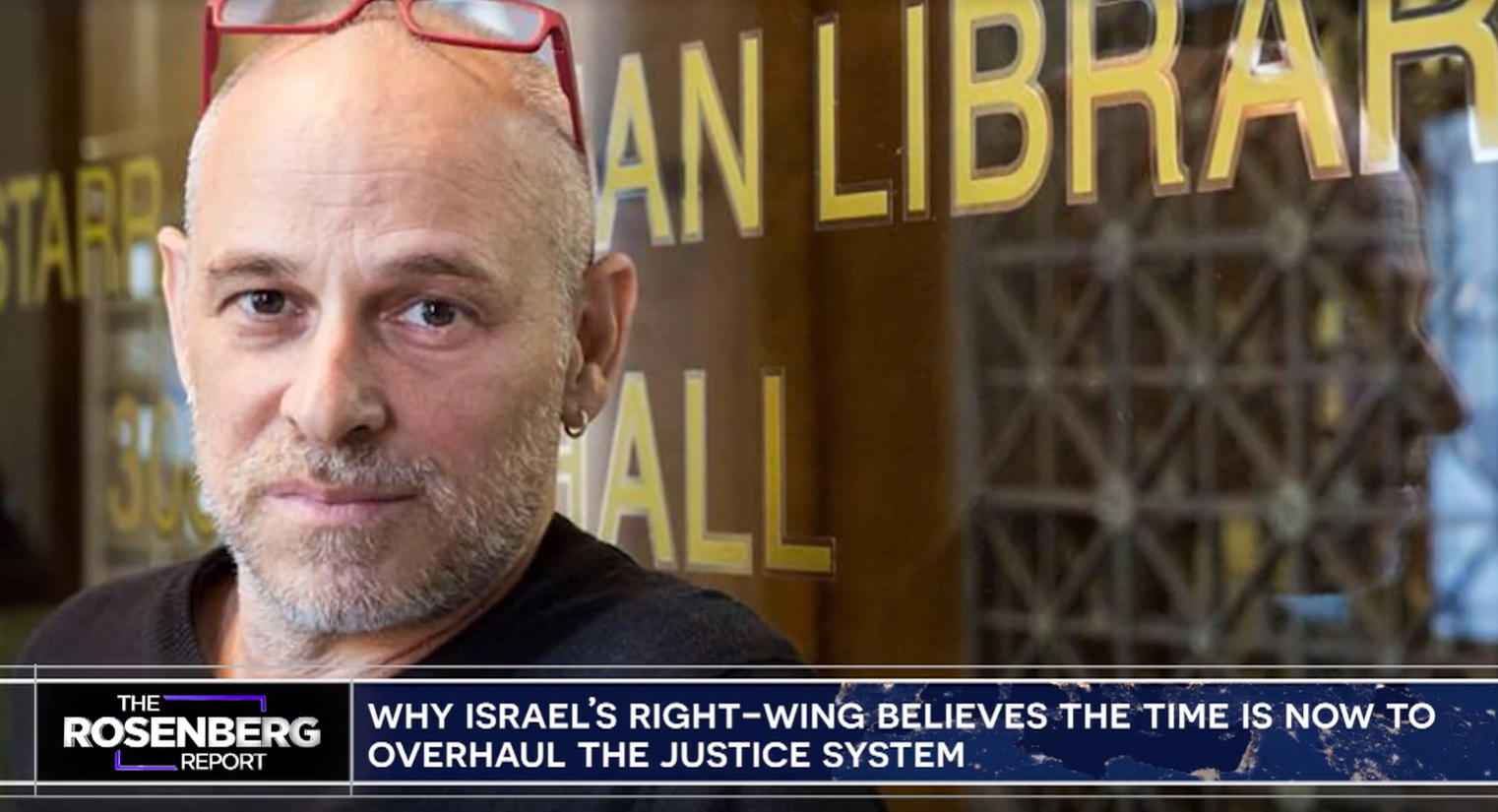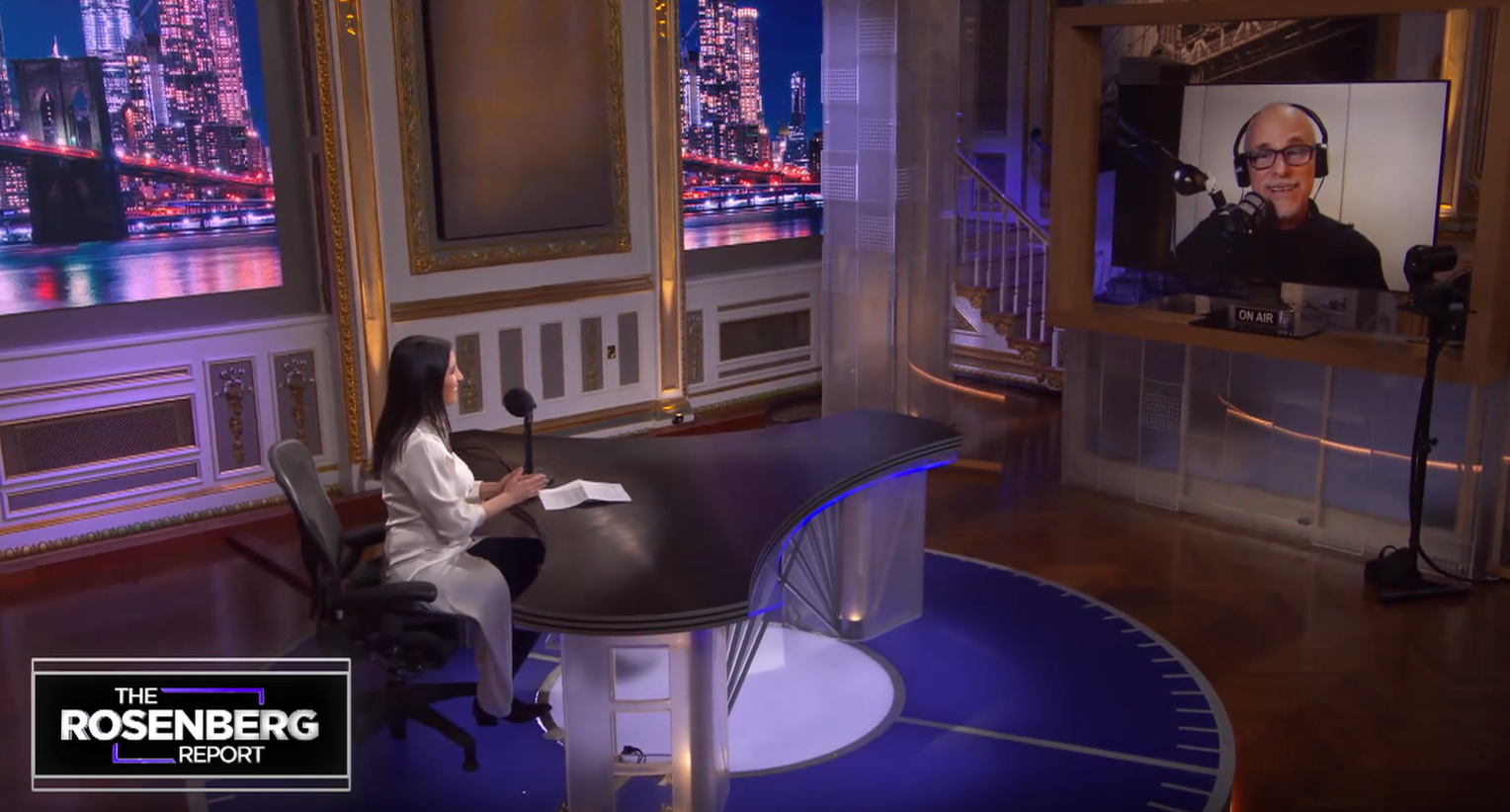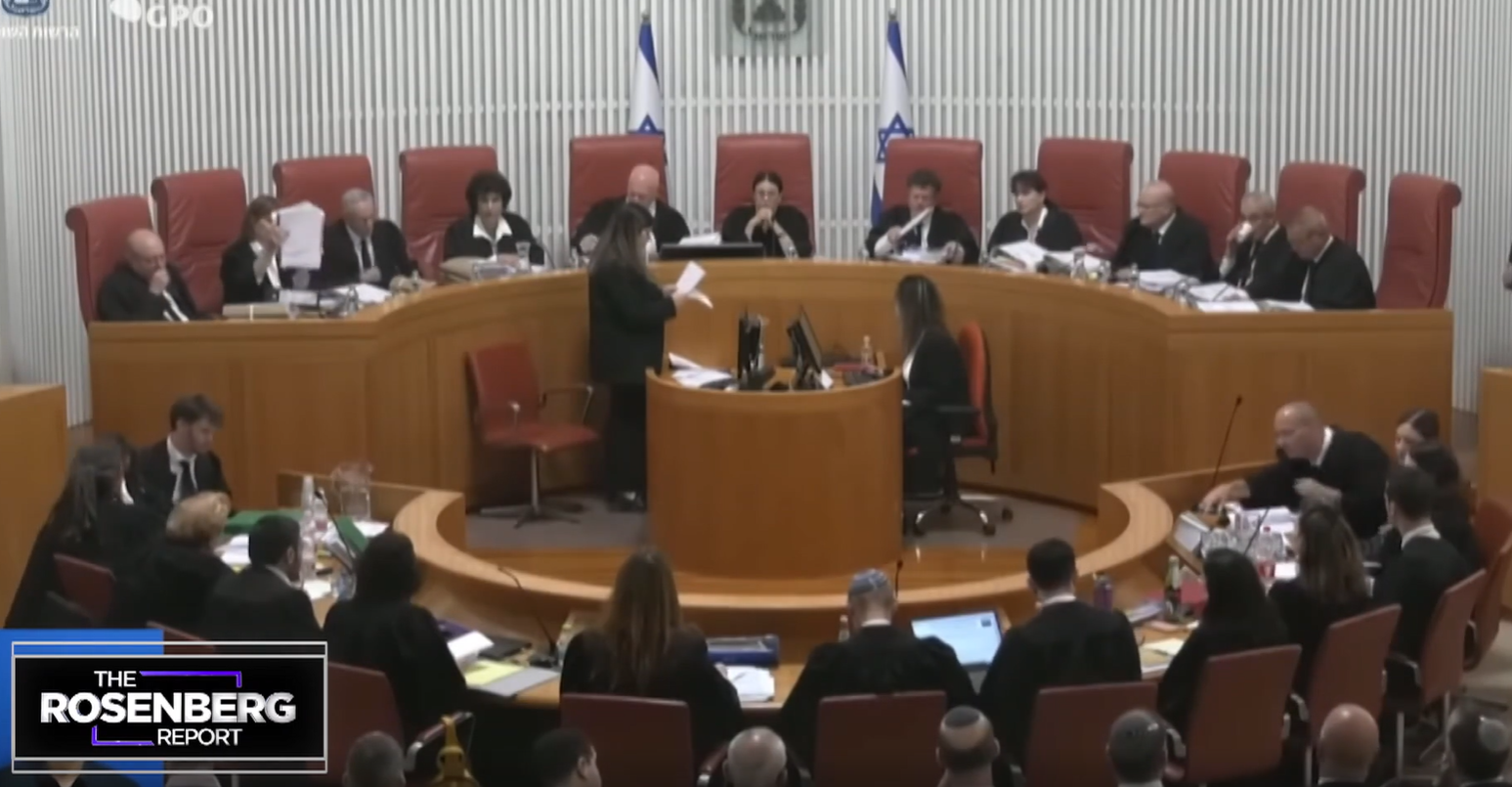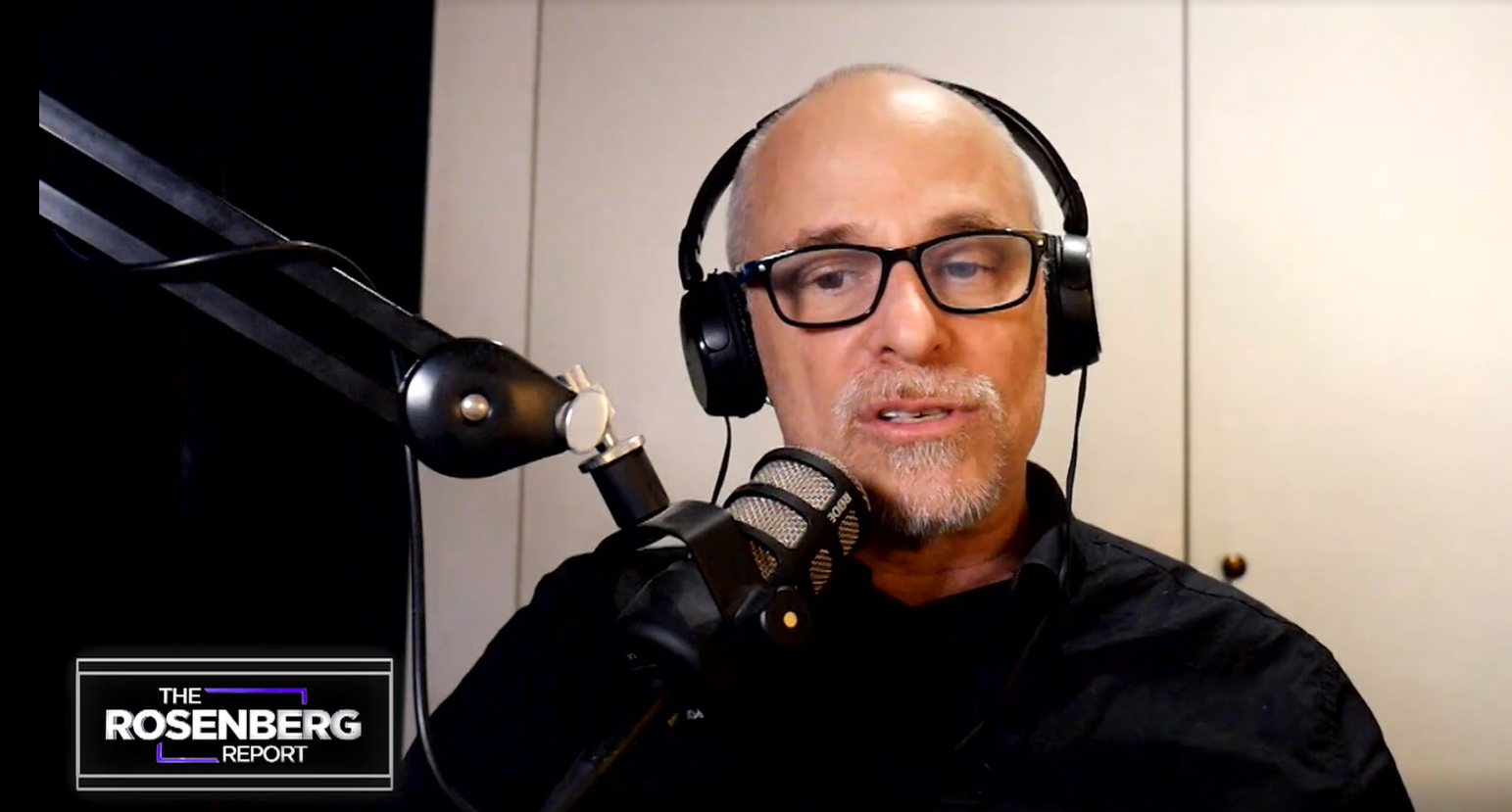WATCH FULL INTERVIEW: Israel’s High Court crushing democracy, legal reform urgently needed, Israeli expert tells THE ROSENBERG REPORT
Prof. Gadi Taub explains why Israel’s Supreme Court is unfair and out of control

NEW YORK CITY – For the past several Saturday nights, upwards of 100,000 Israelis have taken to the streets of Tel Aviv to protest against Israeli Prime Minister Benjamin Netanyahu’s plan to reform the country’s judicial system.
Carrying signs, torches and blue-and-white flags, the protestors – most of them from the political left – say that if passed, the reform would mean “the end to democracy in Israel” and severe harm to the human rights and civil rights of Israeli minorities.
Professor Gadi Taub isn’t buying it.
A prominent Israeli conservative and political commentator, Taub has long been a leading voice arguing that Israel’s judicial system is badly broken.
In an interview with ALL ISRAEL NEWS – some of which aired on the most recent episode of THE ROSENBERG REPORT on TBN – Taub made the case that the Israel’s Supreme Court and other courts are actually anti-democratic, actively thwarting the will of the people and, thus, in urgent and desperate need of sweeping reform.
To watch the full interview on the ALL ISRAEL NEWS YouTube channel, please click below.
“The fact that they [the protestors] are hiding behind the slogans that they are ‘protecting democracy’ is the exact opposite of the truth,” Taub said.
Rather, Taub says the mass demonstrations are not raising the cry of “the people” but rather of the country’s elites.
A BATTLE BETWEEN THE PEOPLE AND THE ELITES
“This reform is about to end the jurists’ autocracy, the rule of judges, the oligarchy that enables Israel small upper crust of a liberal elite to hold power,” he stressed. “So, this is not the end of democracy. It is the end of their tyranny. And they are clinging by the skin of their teeth to power, which the reform is going to restore to the rightful owners, which are the citizens.”
“It's not just the judicial system,” Taub explained. “It's our substitute government. What happened in the four decades since Likud first lost power to the old hegemonic Labor Party is that the left has been transferring the center of political power from electoral branches of government to appointed branches of government. That is to the bureaucracy and above all, to the Supreme Court.”
“Currently, there is no limit to the Supreme Court's power,” Taub said, insisting this is not a hyperbolic statement. “There is nothing that the court sees to be outside its purview, and it thinks it has the final decision on everything.”
Taub notes that because Israel does not have a written constitution, there is no actual law or document that gives the High Court such sweeping power – yet the court has assumed such power for itself.
That, he says, is the crux of the problem.

“EXTREME JUDICIAL OVERREACH”
Many Israelis who vote for the political right, Taub notes, have felt over the years that the country’s left-leaning Supreme Court has annulled or silenced their voices.
Taub defines that as an “extreme judicial overreach.”
Earlier this month, the High Court provided a fresh example of this overreach when it ordered Netanyahu to fire his deputy, Shas party leader Aryeh Deri.
In light of past convictions of criminal activity, the court said that the notion of Deri serving as a government minister was “unreasonable in the extreme.”
Taub says this ruling proves that the dispute is “a political struggle, not a judicial controversy.”
“They demanded the firing of Deri without any basis in the law, because he was convicted long ago on bribery and he served time and also served the chilling period before he could return to politics for seven years,” Taub explained. “And now he was convicted on a tiny technical infringement of tax reporting. And that's all. And there is nothing illegal about him serving as a minister.”
“The court thinks that it can overrule the public's democratic choice, not on the basis of law, but on the basis of reasonableness,” he added.
To underline his point, Taub stressed that when Deri ran in the last elections it was clear to all that he was going to become a minister if Netanyahu was elected.
Israeli voters who knew his record voted for him and gave his party 11 seats in parliament.
“When did petitions from the left arrive? Only after Netanyahu set up his government,” Taub said. “If there was a government on the left and he would have been a candidate for them, [there is] no chance in the world that petitions would have arrived or that the courts would have tried to prevent him from serving as a minister.”

ISRAEL’S HIGH COURT BEGAN MOVING FAR TO THE LEFT IN THE 1990s
The Israeli Supreme Court was not always as “interventionist” as it is today, according to Taub.
It changed its course in the 1990s when the court’s former president, Judge Aharon Barak, enforced his liberal-progressive judicial philosophy through a “constitutional revolution.”
A poll conducted late last year found that public trust in the justice system in Israel decreased by at least 30% between 1991 and 2018.
Prof. Yehonatan Givati from the Hebrew University of Jerusalem, who led the research, was quoted by Israel Hayom newspaper as saying, "there is no court in the world and no institution in Israel that have seen such a dramatic decrease during that period."
“Barak recognized no limit on his power,” said Taub.
“After they enacted his ‘judicial revolution,’ the Court announced ‘Marbury versus Madison style’ that it has the power of judicial review unilaterally. The second phase was to announce that it has the power of judicial review over the Basic Laws, too.”
“So, now it has the power of judicial review over the laws that gave it the power of judicial review. This means that there is no limit to its power. There is no norm above the Supreme Court or a norm that it has to abide by.”

The heated debate in Israel over the judicial reform has received media coverage and attention not only within the borders of the Jewish State, but also outside.
Echoing the case of the Israeli left, a New York Times article warned that “The Ideal of Democracy in a Jewish State Is in Jeopardy.”
Echoing the case of the Israeli right, the Wall Street Journal editorial board argued that “Israel’s Supreme Court makes the best case for its own reform.”
According to Taub, the international interest is not necessarily being driven by sole concern for Israel’s domestic law, but rather the debate’s reflection of a greater issue that also pertains to other western democracies: the tension between nationalism and globalism.
“This is happening all over the Western world, where elites are trying to pull power out of electoral politics and deposit it in the bureaucracy, in the administrative states, in appointed judiciaries, and in international bodies.”

ISRAEL’S BATTLE SIMILAR TO A WIDER GLOBAL FIGHT OVER NATIONALISM AND DEMOCRACY
Taub’s latest book, a best-seller in Hebrew, deals with the subject extensively.
Titled “Global Elites and National Citizens: The Attack of the Upper Classes on Israel’s Democracy,” the book explains why the modern definition of “elites” is not necessarily derived from one’s socio-economic stature, but mainly by one’s ideology.
“The ideological fault line in the contemporary West runs between two opposing visions: an internationalist (or even globalist) orientation, which seeks to ‘transcend’ the nation state, and a national view that seeks to reinvigorate it,” Taub wrote in Tablet magazine.
In the United States, he said, there is a “globalist elite which is trying to undermine the nation state in various ways.”
Taub points to issues often raised by Republican public representatives, such as “subduing before international organizations like the World Health Organization's, the U.N., allowing limitless immigration and also by expanding judiciaries.”

Tal Heinrich is a senior correspondent for both ALL ISRAEL NEWS and ALL ARAB NEWS. She is currently based in New York City. Tal also provides reports and analysis for Israeli Hebrew media Channel 14 News.














